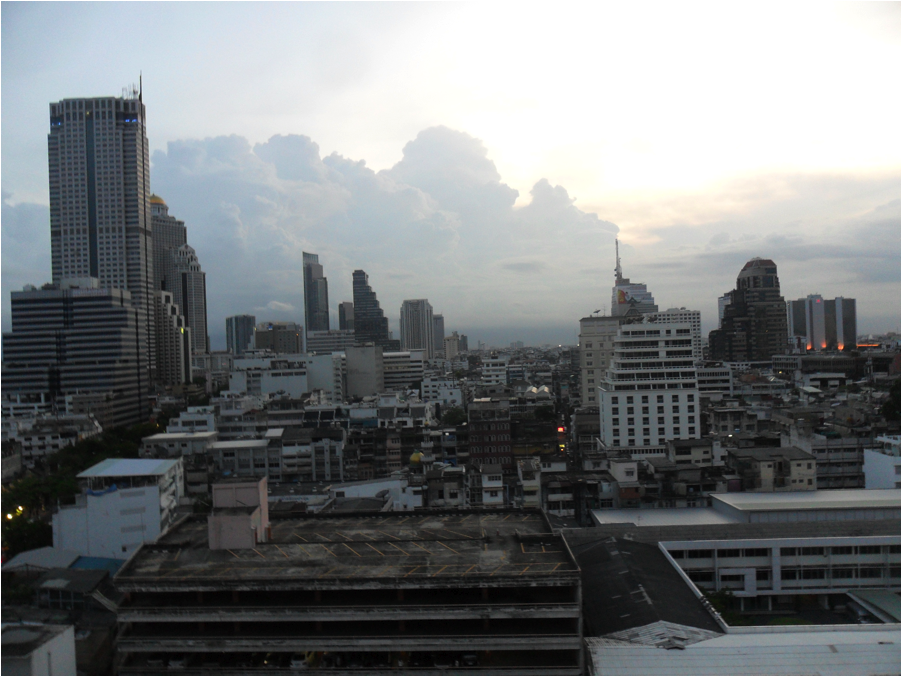
BY OLGA KARNAS
The gates of two kingdoms were silently facing each other, rising above a crowd of dusty backpackers and busy traders. We are entering Thailand via the same route that thousands of Cambodian refuges took following the deadly Khmer Rouge regime. Anxious to experience the only country of Southeast Asia that was never colonized (“Thai” means “free”), we set off on our journey across the eastern side of the country.
Bangkok was to be the last anchor on the journey, simply to understand that it’s not representative of the kingdom. Isan, the northeastern region, is relatively poor, and majorly agricultural. Thailand has the highest revenue from tourism in all of Asia, yet the northeastern region does not attract foreigners, who swarm the beaches of Phuket in the south or mountains in Chiang Mai in the north of the country.

“If you can eat rice, you can tend to it”, we were told by a farmer who kindly agreed to let us transplant rice (insert blades of rice into the mud, simultaneously offering our legs a spa of mud and worms) in a small patch of paddy, aware that he and his wife will have to correct it after us.

The randomness of the rainy night in Bangkok will stay with me for a long time. We walked to escape the area of hotels and hotel boys. Even though it was long after dusk, it was physically perceptible how much shade these buildings generate. Hotel boys were offering to order me taxis, and even though their night was not to come to a close with a comfortable bed, they retained enthusiastic youthful smiles. Guards, softly napping on their plastic chairs, were supposed to be protectors, but underneath the heaps of hotels, they were transformed into jailers. Lights of the city were filtering through. I kept walking, leaving my five friends paces behind and a little anxious. Our aim was to sniff the bowels of Krung Thep (“City of Angels”).
And there must have been somewhere to sniff it. And then, passing by, I saw love in Bangkok. Far from the pavement, at the entrance steps to some store, a couple were sitting, their limbs intertwined like the tree trunk of a banyan tree. I want to think they were fixing their gaze on the future, but it could have as well been the warm rain.

Then a female taxi driver passed by, unconscious of my staring at her.
A foreign tourist enlightened me that we had wandered into the Red Light district. He had a satisfied air about him, and a beer in the Irish Pub. From the heights of being an expat, comfortable with the city, he was mocking the naiveté of tourists.
What he didn’t say was that the district was seamlessly attached to an Arab district. A women in a burqa was sitting on a pavement next to a prostitute, and it was me, not them, who had to come to terms with that pavement symbiosis.

In a spacious restaurant, on a screen no one paid any attention to, Ghana played against Chile. The view was obstructed by the smoke from shishas, and the sound was overridden by the irresistible chatter of merchants at the nearby table. And while Chile was losing their match, we were winning our Battle of Bangkok. We saw what we wanted to see, and whether it was for the locals or for tourists, a small shred or a representative sample, reality or a rainy night, it didn’t matter.
I didn’t dare to take pictures as I walked. I took thoughtless shots from the taxi when leaving the area for the confines of our comfortable and characterless hotel.

I got the last of my share of smiles at the Suvarnabhumi Airport, from a young woman proudly presenting her uniform (Thailand is officially advertised as “The Land of a Thousand Smiles”).
Olga Karnas ’16 is blogging this summer from Singapore as well as her trips to Cambodia and Thailand. Contact her at olga.karnas@yale.edu.
